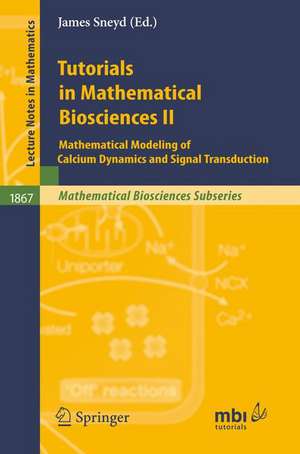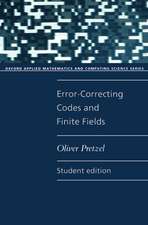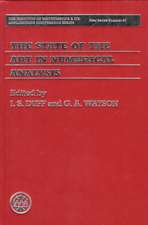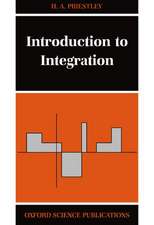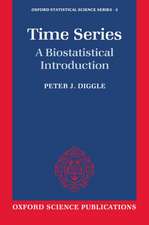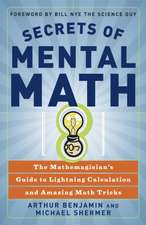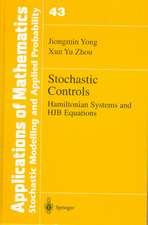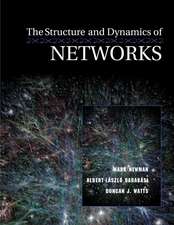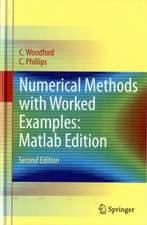Tutorials in Mathematical Biosciences II: Mathematical Modeling of Calcium Dynamics and Signal Transduction: Lecture Notes in Mathematics, cartea 1867
Editat de James Sneyd Contribuţii de R. Bertram, J.L. Greenstein, R. Hinch, E. Pate, J. Reisert, M.J. Sanderson, T.R. Shannon, J. Sneyd, R.L. Winslowen Limba Engleză Paperback – 22 iun 2005
It is intended primarily as a graduate text or a research reference. It will serve as a concise and up-to-date introduction to all those who wish to learn about the state of calcium dynamics modeling, and how such models are applied to physiological questions.
Din seria Lecture Notes in Mathematics
- 17%
 Preț: 360.42 lei
Preț: 360.42 lei -
 Preț: 459.92 lei
Preț: 459.92 lei -
 Preț: 121.41 lei
Preț: 121.41 lei -
 Preț: 175.68 lei
Preț: 175.68 lei -
 Preț: 197.00 lei
Preț: 197.00 lei -
 Preț: 279.76 lei
Preț: 279.76 lei -
 Preț: 477.65 lei
Preț: 477.65 lei - 17%
 Preț: 361.88 lei
Preț: 361.88 lei -
 Preț: 252.37 lei
Preț: 252.37 lei -
 Preț: 353.99 lei
Preț: 353.99 lei -
 Preț: 138.88 lei
Preț: 138.88 lei -
 Preț: 152.61 lei
Preț: 152.61 lei -
 Preț: 116.67 lei
Preț: 116.67 lei -
 Preț: 102.77 lei
Preț: 102.77 lei - 17%
 Preț: 365.52 lei
Preț: 365.52 lei -
 Preț: 396.75 lei
Preț: 396.75 lei - 17%
 Preț: 362.12 lei
Preț: 362.12 lei -
 Preț: 396.11 lei
Preț: 396.11 lei -
 Preț: 357.78 lei
Preț: 357.78 lei - 17%
 Preț: 362.31 lei
Preț: 362.31 lei -
 Preț: 403.80 lei
Preț: 403.80 lei - 17%
 Preț: 361.70 lei
Preț: 361.70 lei -
 Preț: 499.87 lei
Preț: 499.87 lei -
 Preț: 457.03 lei
Preț: 457.03 lei -
 Preț: 395.90 lei
Preț: 395.90 lei -
 Preț: 459.00 lei
Preț: 459.00 lei -
 Preț: 487.57 lei
Preț: 487.57 lei -
 Preț: 424.01 lei
Preț: 424.01 lei -
 Preț: 487.57 lei
Preț: 487.57 lei -
 Preț: 330.55 lei
Preț: 330.55 lei -
 Preț: 325.75 lei
Preț: 325.75 lei -
 Preț: 350.30 lei
Preț: 350.30 lei -
 Preț: 331.31 lei
Preț: 331.31 lei -
 Preț: 408.37 lei
Preț: 408.37 lei -
 Preț: 328.25 lei
Preț: 328.25 lei -
 Preț: 421.28 lei
Preț: 421.28 lei -
 Preț: 276.08 lei
Preț: 276.08 lei -
 Preț: 424.60 lei
Preț: 424.60 lei -
 Preț: 422.05 lei
Preț: 422.05 lei -
 Preț: 505.01 lei
Preț: 505.01 lei -
 Preț: 422.05 lei
Preț: 422.05 lei -
 Preț: 274.93 lei
Preț: 274.93 lei -
 Preț: 335.16 lei
Preț: 335.16 lei -
 Preț: 422.27 lei
Preț: 422.27 lei -
 Preț: 497.49 lei
Preț: 497.49 lei -
 Preț: 272.81 lei
Preț: 272.81 lei -
 Preț: 428.04 lei
Preț: 428.04 lei -
 Preț: 376.22 lei
Preț: 376.22 lei -
 Preț: 427.10 lei
Preț: 427.10 lei -
 Preț: 325.92 lei
Preț: 325.92 lei
Preț: 416.87 lei
Nou
Puncte Express: 625
Preț estimativ în valută:
79.78€ • 82.42$ • 66.40£
79.78€ • 82.42$ • 66.40£
Carte tipărită la comandă
Livrare economică 26 martie-09 aprilie
Preluare comenzi: 021 569.72.76
Specificații
ISBN-13: 9783540254393
ISBN-10: 3540254390
Pagini: 212
Ilustrații: X, 202 p. 87 illus., 16 illus. in color.
Dimensiuni: 155 x 235 x 12 mm
Greutate: 0.32 kg
Ediția:2005
Editura: Springer Berlin, Heidelberg
Colecția Springer
Seriile Lecture Notes in Mathematics, Mathematical Biosciences Subseries
Locul publicării:Berlin, Heidelberg, Germany
ISBN-10: 3540254390
Pagini: 212
Ilustrații: X, 202 p. 87 illus., 16 illus. in color.
Dimensiuni: 155 x 235 x 12 mm
Greutate: 0.32 kg
Ediția:2005
Editura: Springer Berlin, Heidelberg
Colecția Springer
Seriile Lecture Notes in Mathematics, Mathematical Biosciences Subseries
Locul publicării:Berlin, Heidelberg, Germany
Public țintă
ResearchCuprins
Preface.- Introduction.- Basic Concept of Ca2+ Signaling in Cells and Tissues (M. J. Sanderson).- Modeling IP-3-Dependent Calcium Dynamics in Non-Excitable Cells (J. Sneyd).- Integrated Calcium Management in Cardiac Myocytes (T. R. Shannon).- Mechanisms and Models of Cardiac Excitation-Contraction Coupling (R. L. Winslow, R. Hinch, J. L. Greenstein).- Mathematical Analysis of the Generation of Force and Motion in Contracting Muscle (E. Pate).- Signal Transduction in Vertebrate Olfactory Receptor Cells (J. Reisert).- Mathematical Models of Synaptic Transmission and Short-Term Plasticity (R. Bertram).
Recenzii
From the reviews:
"The book is mainly a research reference book but may be of interest for graduate students specializing in the fields of cell physiology and signal transduction. The book is an excellent, up-to-date survey for those who wish to learn about the state of calcium dynamic modelling and how such models are applied to physiological questions … . Much of the underlying physiology is clearly presented to help the reader to follow the modelling." (Johnny Tom Ottesen, Mathematical Reviews, Issue 2006 h)
"The book is mainly a research reference book but may be of interest for graduate students specializing in the fields of cell physiology and signal transduction. The book is an excellent, up-to-date survey for those who wish to learn about the state of calcium dynamic modelling and how such models are applied to physiological questions … . Much of the underlying physiology is clearly presented to help the reader to follow the modelling." (Johnny Tom Ottesen, Mathematical Reviews, Issue 2006 h)
Notă biografică
James Sneyd already published one book with Springer which won a prize for best math book in 1998 (American Association of Publishers). Achi Dosanjh will have copies of any reviews of this book, which have been favourable in general:
Mathematical Physiology
Series: Interdisciplinary Applied Mathematics, Vol. 8
Keener, James, Sneyd, James
1st ed. 1998. Corr. 2nd printing, 2001, XIX, 766 p. 347 illus., Hardcover
ISBN: 0-387-98381-3
He is also an author of: S. Camazine, J.-L. Deneubourg, N. Franks, J. Sneyd, Guy Theraulaz, Eric Bonabeau, Self-Organization in Biological Systems, Princeton University Press, 2001. Winner of Best Professional/Scholarly Book in Biological Science (2001), American Association of Publishers. One of Choice’s Outstanding Academic Titles for 2002.
Mathematical Physiology
Series: Interdisciplinary Applied Mathematics, Vol. 8
Keener, James, Sneyd, James
1st ed. 1998. Corr. 2nd printing, 2001, XIX, 766 p. 347 illus., Hardcover
ISBN: 0-387-98381-3
He is also an author of: S. Camazine, J.-L. Deneubourg, N. Franks, J. Sneyd, Guy Theraulaz, Eric Bonabeau, Self-Organization in Biological Systems, Princeton University Press, 2001. Winner of Best Professional/Scholarly Book in Biological Science (2001), American Association of Publishers. One of Choice’s Outstanding Academic Titles for 2002.
Textul de pe ultima copertă
This book presents a series of models in the general area of cell physiology and signal transduction, with particular attention being paid to intracellular calcium dynamics, and the role played by calcium in a variety of cell types. Calcium plays a crucial role in cell physiology, and the study of its dynamics lends insight into many different cellular processes. In particular, calcium plays a central role in muscular contraction, olfactory transduction and synaptic communication, three of the topics to be addressed in detail in this book. In addition to the models, this book also presents much of the underlying physiology, so that readers may learn both the mathematics and the physiology at the same time, and see how the models are applied to specific biological questions. It is thus neither a mathematics book nor a physiology book, but has features from both sides of the fence.
It is intended primarily as a graduate text or a research reference. However, some parts of the book, particularly the introductory chapters on calcium dynamics will be well within the reach of some undergraduates. It will serve as a concise and up-to-date introduction to all those who wish to learn about the state of calcium dynamics modeling, and how such models are applied to physiological questions.
It is intended primarily as a graduate text or a research reference. However, some parts of the book, particularly the introductory chapters on calcium dynamics will be well within the reach of some undergraduates. It will serve as a concise and up-to-date introduction to all those who wish to learn about the state of calcium dynamics modeling, and how such models are applied to physiological questions.
